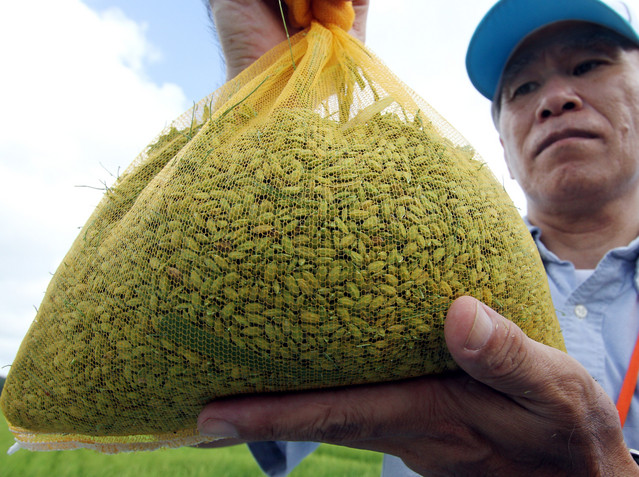You are here
Bloomberg - By Jae Hur and Yasumasa Song - August 7, 2011

An official from the Chiba Prefectural Government Offices shows a sack of rice samples bound for radiation tests at a field in Katori City, Chiba Prefecture, Japan.
Rice futures in Tokyo surged on the first day of trading after a seven-decade halt, triggering the bourse to suspend trade, on concern radiation from the stricken Fukushima nuclear plant may spread to crops and curb supply.
No deals were concluded on the Tokyo Grain Exchange after prices hit 18,500 yen per 60 kilograms from the opening, compared with the bourse’s reference price of 13,500 yen. The surge triggered trade to be suspended.
The exchange listed rice contracts today for the first time since the start of World War II to boost flagging volumes and profit. The resumption comes as fallout from the Fukushima Dai- Ichi power plant may spread after it was found cattle had been fed cesium-tainted rice straw.
“People are very concerned that rice supplies may be smaller on fear of radiation contamination,” Nobuyuki Chino, chairman of the exchange’s rice futures trading committee, told reporters in Tokyo. “This was reflected in the prices,” said Chino, who is also president of Tokyo-based grain company Continental Rice Corp.
Commercial stockpiles of rice, a Japanese staple, may drop to the lowest level in four years in 2012, after the March earthquake and nuclear disaster curbed production, possibly spurring the government to release its reserves, according to the agriculture ministry.
Growing Criticism
Faced with criticism from consumer groups and opposition party politicians that lax government control has endangered food safety, the ministry has tightened rice screening before the harvest begins in eastern Japan.
The government ordered Fukushima and 13 nearby prefectures to test rice samples before the harvest. Authorities will ban shipments from areas where they find grains containing cesium exceeding 500 becquerels a kilogram. Rice production in Fukushima and neighboring Ibaraki, Miyagi and Iwate prefectures amounted to 1.56 million metric tons last year, out of the country’s total of 8.5 million tons.
Japan is self-sufficient in the grain as the government protects growers from foreign competition with a tariff of 341 yen ($4.35) a kilogram on imports.
http://www.bloomberg.com/news/2011-08-08/rice-in-tokyo-gains-after-seven-decade-halt.html



Recent Comments